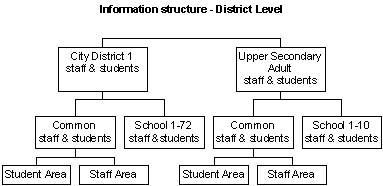PedNet – A Virtual Community for 80 Schools
Background
Most teachers using the Internet in education as a source of information seem to agree that however great the potentials are, there are certain discouraging aspects involved that might restrain them from using it such as
| searching is time-consuming | |
| un-assessed information | |
| quality and reliability aspects | |
| difficulty in verifying the source |
Another aspect, especially important when younger kids are involved, is the fact that you never know what kind of web pages that might appear on the computer screen.
Internet is also an excellent means of communication. In this field, however, there seems to be even more apprehensions about the use. Public places for communication are usually unsuitable for students. And if you find a decent place, how do you know whom they are really communicating with?
Basically there are two ways to cope with these obstacles: To restrict the use or to guide the users. PedNet was built to guide the users.
PedNet - A Virtual School Community
In the city of Malmo there are about 80 schools. The Head Office of Education deals with upper secondary and adult education. We have 10 upper secondary schools for students 16-19 years old, both general and vocational. Compulsory schools, primary and secondary, belong to the ten city districts of Malmo. In all this means 40 000 teachers and students.
In early Spring 1999 we started planning and building a virtual platform that was to be reachable anywhere, at any time with a personal log in for everyone.
From the turn of the millennium all teachers and students from primary schools up to adult education have access to the system, which makes it the biggest system of its kind in Sweden.
Information Structure
The information and conference structure consists of different levels. On the top level you can find information and conferences of interest intended either for all staff and students or for staff or students only. This is also the level where you find your personal mailbox, user manual and support.
Model desktops have been created for and adapted to each category of user to avoid too many icons. Areas that are of no interest to the user or where the user is not allowed are not visible at all. Accordingly teachers and students at compulsory schools may continue to the district area and teachers and students at upper secondary schools may continue to the their area.

On each level and within each area you find specific information and conferences.

This is the basic structure that was introduced in November 1999, when a two months’ test period started. The development of PedNet from this point on is totally connected to the needs and wishes of the schools. What is happening on school level is by far the most interesting.

Organisation
Each school can adapt the structure and contents on a local level to their activities and projects. To facilitate this there are PedNet representatives in each school and district.
These representatives are teachers or head teachers, not technicians, since their task is to be locally responsible for the pedagogical use and development of PedNet.
Fields of application:
| Creating virtual environments with good teaching material and advice | |
| Virtual mentorship and on line tutoring | |
| Conferences for projects and themes | |
| Students’ work, students’ council |
Information such as
| Schedule | |
| Curriculum | |
| Project plans |
The Pedagogical Outcome
Since the test period started in November 1999 more than 500 teachers and their students have been involved in new ICT-oriented projects in Malmo as a part of the national Action Programme for ICT in Schools, ITiS, where the Swedish Government is investing 1.5 billion SEK. The University of Malmo will be involved in the evaluation of these projects.
The key issues are development of new teaching methods and learning environments in order to stimulate a problem-oriented way of teaching comprising various methods of solving problems.
It is our belief that PedNet will be an important educational tool in these projects as well as in the daily schoolwork.
Being responsible for the development of the pedagogical use of PedNet we will closely follow what is happening on different levels and continuously adapt and enhance the system to meet the pedagogical creativity in the schools.
We plan to finish a first evaluation of the pedagogical use in May 2000.
Ulf Akerberg
ICT Manager
Pedagogical Centre
Hards vag 5
213 67 Malmo
SWEDEN